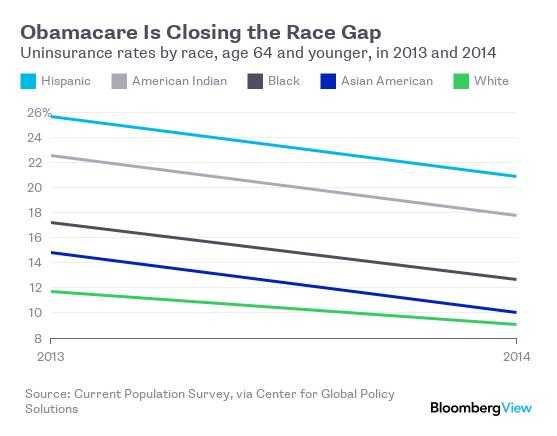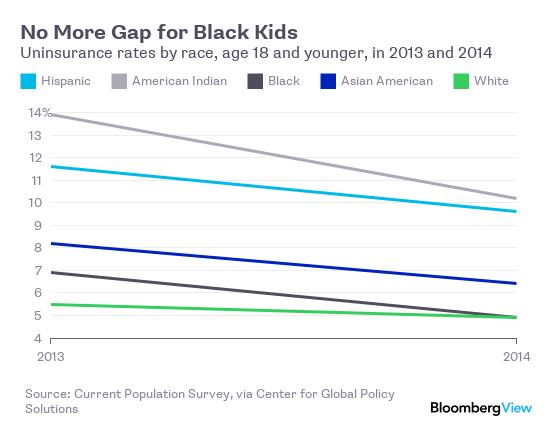Whatever Obamacare's shortcomings, a new paper shows one place where the law has been a clear success: narrowing the race gap in health insurance. So why aren't more Democrats shouting that from the rooftops?
In 2013, the year before most of the law's provisions for subsidized insurance took effect, non-elderly blacks were 47 percent more likely than whites to be uninsured. For American Indians, that figure was 93 percent; for Hispanics, 120 percent.
In 2014, not only did the share of whites without insurance fall; the share of blacks and Asian Americans fell by more. The difference between whites and Hispanics shrank, from 14 percentage points to 11.8 percentage points.

The improvement was particularly striking for children: Last year, blacks 18 and younger were no more likely to be uninsured than whites.

The point of the paper, written by Algernon Austin at the Center for Global Policy Solutions, isn't just to celebrate those gains, but also to show how much room remains for improvement. One of the biggest obstacles to reducing the number of uninsured blacks is the refusal of many states with large black populations to accept federal money to expand their Medicaid programs. Some of those states may come around eventually, but don't hold your breath.
What's odd about the race gap isn't its persistence, but that its narrowing isn't more celebrated as one of the law's accomplishments. When asked why he thought the gap doesn't get more attention, Austin noted that Obama has spent less time than his predecessors talking about race. "It's been a stance of the administration to really emphasize that President Obama is the president for all Americans," Austin said.
Perhaps the administration worries that emphasizing the benefits of Obamacare for minorities might make whites think the law isn't so much about them, jeopardizing already tepid
public support. In that sense, not harping on race might be good strategy: Maybe the country's fraught relationship with race means the only way to close the gap in health insurance is, in effect, by stealth.
Obamacare, Assessed
But there's a ceiling on what can be achieved that way. The minimal fanfare risks leaving many Americans unaware of the disproportionate toll on minorities of the U.S. health system's failings, or the consequences of states refusing new Medicaid money.
Narrowing the race gap in health insurance counts unequivocally as progress. Closing it altogether will require still bigger steps, Austin said, such as expanding Medicaid further or even (gulp) single-payer health care. That level of change is hard to imagine -- especially if voters don't fully appreciate the problem it's meant to solve.
Bloomberg
To contact the author of this story:
Christopher Flavelle at
[email protected]



